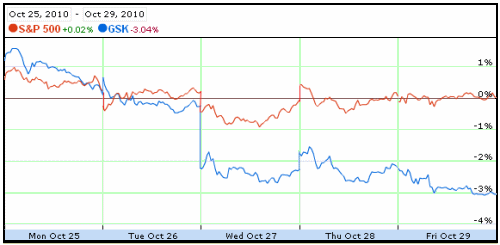Glaxo to Pay $750 Million for Sale of Bad Products
The New York Times
GARDINER HARRIS
October 26, 2010GlaxoSmithKline, the British drug giant, has agreed to pay $750 million to settle criminal and civil complaints that the company for years knowingly sold contaminated baby ointment and an ineffective antidepressant — the latest in a growing number of whistle-blower lawsuits that drug makers have settled with multimillion-dollar fines.
Altogether, GlaxoSmithKline sold 20 drugs with questionable safety that were made at a huge plant in Puerto Rico that for years was rife with contamination. Cheryl D. Eckard, the company’s quality manager, asserted in her whistle-blower suit that she had warned Glaxo of the problems but the company fired her instead of addressing them. Among the drugs affected were , an antidepressant; Bactroban, an ointment; , a troubled drug; Coreg, a heart drug; and , an drug. No patients were known to have been sickened, although such cases would be difficult to trace.
In a rising wave, recent lawsuits have asserted that drug makers misled patients and defrauded federal and state governments that, through and , pay for much of health care. Using claims from industry insiders, federal prosecutors are not only demanding record fines but are hinting at more severe actions. Suffering a research drought, drug makers have laid off thousands of employees. Some of those dispatched have in turn filed whistle-blower lawsuits that can lead to criminal investigations.
Justice Department officials announced the settlement in a news conference Tuesday afternoon in Boston, saying a $150 million payment to settle criminal charges was the largest such payment ever by a manufacturer of adulterated drugs. The outcome also provides $600 million in civil penalties. The share to the whistle-blower will be $96 million, one of the highest such awards in a health care fraud case…
When GlaxoSmithKline announced in July that it was setting aside $2.4 billion for legal costs, including enough to pay for the investigation into its Puerto Rico problems, the announcement was greeted with a yawn. Still, the case may lead to a collective industry shiver because it opens a new frontier for whistle-blower suits. Nearly all previous cases against the industry involved illegal marketing. This is the first successful case ever to assert that a drug maker knowingly sold contaminated products. “This case will change the way drug makers run their factories,” Ms. Eckard’s lawyer, Neil Getnick, said.
Some of the antidepressant Paxil CR produced at the plant was ineffective because a layer of active ingredient split from a layer of a barrier chemical during manufacturing, the government said, and some lots contained only the barrier chemical. “The harm is really in the public’s confidence in the health care industry,” Ms. Ortiz said. “When you go to a pharmacy and you buy a drug, you expect that drug is what it purports to be and you don’t expect it to have any micro-organisms or not be sterile or not have the power or have too much power”…
This was GlaxoSmithKline’s premier manufacturing facility, producing $5.5 billion of product each year. But Ms. Eckard soon discovered that quality control was a mess: the water system was contaminated; the air system allowed for cross-contamination between products; the warehouse was so overcrowded that rented vans were used for storage; the plant could not ensure the sterility of intravenous drugs for cancer; and pills of differing strengths were sometimes mixed in the same bottles…
I think the most impressive piece of this settlement is the $96M payout to the whistle blower. That’s going to keep people on their toes!

Sorry, the comment form is closed at this time.